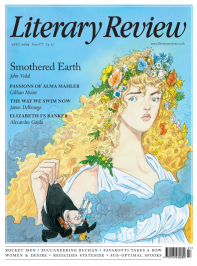John Gribbin
When Computers Rule the World
Novacene: The Coming Age of Hyperintelligence
By James Lovelock with Bryan Appleyard
Allen Lane 138pp £14.99
Few people produce a new book in their hundredth year; fewer still at that age produce a book containing original ideas. But if anyone was going to do it, it surely had to be James Lovelock. He has been having good ideas for at least seventy-five of the past hundred years and is best known for one that occurred to him half a lifetime ago – the concept, which he named the Gaia hypothesis, that the Earth is a living organism. His new book, written with Bryan Appleyard, looks forward to the future of that organism, a future in which humankind is unlikely to play a major role, having fulfilled its ‘purpose’ by ushering in an era of artificial intelligence, the Novacene.
I should at this point declare an interest. I have known Lovelock for more than half my life, and nearly half of his, and have written a biography (now clearly in need of updating) covering a large part of his life. I come to praise Caesar, not to bury him. That said, if his latest book had contained the ramblings of a once great mind in its dotage, I would as a friend have ignored it. But because it is as important and accessible as anything he has written, if shorter than one might have hoped, I can recommend it with a clear conscience.
Underpinning Lovelock’s book is his conviction that as a home of intelligent life our planet is probably unique, at least in our galaxy, if not in the universe as a whole. This may seem to fly in the face of the latest discoveries of myriad planets orbiting stars

Sign Up to our newsletter
Receive free articles, highlights from the archive, news, details of prizes, and much more.@Lit_Review
Follow Literary Review on Twitter
Twitter Feed
The era of dollar dominance might be coming to an end. But if not the dollar, which currency will be the backbone of the global economic system?
@HowardJDavies weighs up the alternatives.
Howard Davies - Greenbacks Down, First Editions Up
Howard Davies: Greenbacks Down, First Editions Up - Our Dollar, Your Problem: An Insider’s View of Seven Turbulent...
literaryreview.co.uk
Johannes Gutenberg cut corners at every turn when putting together his bible. How, then, did his creation achieve such renown?
@JosephHone_ investigates.
Joseph Hone - Start the Presses!
Joseph Hone: Start the Presses! - Johannes Gutenberg: A Biography in Books by Eric Marshall White
literaryreview.co.uk
Convinced of her own brilliance, Gertrude Stein wished to be ‘as popular as Gilbert and Sullivan’ and laboured tirelessly to ensure that her celebrity would outlive her.
@sophieolive examines the real Stein.
Sophie Oliver - The Once & Future Genius
Sophie Oliver: The Once & Future Genius - Gertrude Stein: An Afterlife by Francesca Wade
literaryreview.co.uk